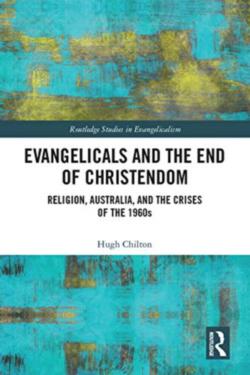Evangelicals and the End of Christendom: Religion, Australia, and the Crises of the 1960s
Hugh Chilton.
Routledge
With the soundtrack of the 1960s and 1970s as some of my earliest musical memories, I heard them again (metaphorically not literally) when reading Hugh Chilton’s magnificent book Evangelicals and the End of Christendom: Helen Reddy’s “I am woman,” Whitlam’s “It’s time” jingle, and “Leaving on a jet plane” by the trio of Peter, Paul and Mary. Indeed, the period which Chilton investigates will not only bring back ear-worms like these, but for some readers difficult debates, lost opportunities, perhaps even a sense of gratitude. These were decades in Australia that witnessed the rapid dismantling of the British Empire, Cold War conflicts in south-east Asia, a new sense of national purpose in Australia impacted by multicultural migration, and technologies which changed our quotidian lives. How evangelical Christians responded to or contributed to these tumultuous changes is Chilton’s goal in this book, which in other words is to summarise the place of evangelicals in the story of Australia at the end of Christendom. These are highly contested categories, but when they are placed here within the concrete framework of Billy Graham’s visits to Australia in 1959 and 1968-69, and 1979, they gain in clarity. If Graham is seen as a leading representative of post-war evangelicalism, reactions to him are a kind of bellwether, signalling a change of wind direction.
Indeed, concrete exploration of six leading figures in this period constitutes the substance of the book. Chilton has not begun with an ideological frame of reference into which these historical figures are shoe-horned, but rather he allows for complexity and nuance in the story he tells. The six chapters treat Fred Nile and the (youth movement) World’s Christian Endeavour, Han Mol the Presbyterian sociologist of secularisation, Billy Graham and Australian engagement with the American pseudoempire, Archbishop Marcus Loane in the context of the 1970 Cook Bicentenary, the Christian counter-culture and the Jesus People of the 1970s, and the substantial contribution of Bishop Jack Dain and Athol Gill to the Lausanne Congress, its backstory and impact (the selfconsciousness of indigenous Australians is an especially important dimension here). The introduction to these chapters expound the secularisation thesis in the light of the rupture of the 1960s, and the conclusion provides a bird’s eye view of the whole, important when there are so many layers to the story. Firstly, how evangelicals have positioned themselves in the nation, secondly how they have pursued an international network, and thirdly how they have managed tensions on the home front are the three dimensions to the presentation (p205).
This book, though not uncritical of the sins of the movement which reflect the sins of the nation, is however a respectful account of the part evangelicals have played in our national narrative focussed on the 1960s as a window into that story. To tell the story, Chilton takes up Bebbington’s language of conversionism, activism, crucicentrism and biblicism which have proved so enduring as markers of evangelical identity, but he is not beholden to them. Many commentators disconnect them from any longer narrative and therefore disconnect them from eschatology. Not so Chilton. In fact, he implicitly critiques their reductionism when he describes evangelicalism not merely as a set of abstract theological commitments, but sets these commitments within the bigger story of populist protest against nominal Christianity since the 1730s.
Evangelicalism promotes vital piety as a protest against the notion of establishment Christianity and navigates themes within the mental map of national understanding, therefore reflecting providential themes as well. Indeed, evangelicals have been nation builders and agents of cultural renewal. We have found ourselves engaged with the life of the nation when we have accepted the conditions of British imperial advance, or defined ourselves over and against Roman Catholic immigration, or taken sides during the Vietnam War. Our place in constructing modern Australia is not easy to narrate, nor is the contribution of evangelicals without tensions, but resoundingly our involvement has not been marginal, even when it has suited our temperament or theological convictions to speak prophetically from the edge.
Evangelical Christians have been carriers of modernity as well as leading opponents, which reminds us that our movement, one of the most vital in the Christian world today, is not merely defined by Trump activists or hyperspiritual separatists. It maintains a tradition of significant spiritual stature and philosophical pedigree.
Some surprising facts. After the Lausanne Congress of 1974, The Australian ran a four-page spread on the event, paid for by the Evangelical Alliance. Chilton notes – perhaps needlessly – that this is well-nigh inconceivable today (p186)! Church attendance per month in Australia is double the number of people who attend all kinds of football (p213). Billy Graham heard of the assassination of Martin Luther King Jnr in 1968 while playing golf in Brisbane, so his tour was shrouded by a sense of crisis in the US (p83). In an address in the presence of the Queen during her visit in 1973, Sir Marcus Loane amended Psalm 137:5 by replacing the word “Zion”: “If I forget thee, O England, may my right hand forget all her skill” (p133). Australia has perhaps the longest running survey of Christian beliefs in the world (p56). A global youth ministry network, the Christian Endeavor organisation was perhaps “one of the largest voluntary associations in the world” (p27) in the first half of the twentieth century and profoundly shaped the leadership of Fred Nile. The march on Canberra in 1973 by the Jesus People gathered under the banner of “Kairos,” meaning the appointed time, to rival Whitlam’s election slogan (p143). This book does double service by addressing questions concerning the metanarrative of Western history and by sifting through the granular details of personalities and events, a witness to much time and effort spent in archives. No wonder with so much fresh material, and with Chilton’s sure prose, this book is stimulating to read.
Now with this panoptic account in our hands, many other articles or books can now be written, taking up Chilton’s framework and exploring other people or moments. I would have liked to see some exploration of the work of David Penman in this period during his time labouring for the CMS and the IFES in the Middle East, given that his work in Pakistan especially was to influence his later ministry as Archbishop of Melbourne. The work of the Australian Fellowship of Evangelical Students in the 1960s and 1970s is worthy of much further historical attention, as would be the impact of new assumptions concerning authority on theological education. How church-planting fared at the perimeters of our cities after the boom of the 1950s is surely a doctoral dissertation in the waiting as well! This wish list aside, there can be no denying the value of the breadth of the material included in this volume, along with the groovy photos to anchor the text. I dare you to read and not find something to sing along to.

Rev Dr Rhys Bezzant is Dean, Anglican Institute, and Senior Lecturer Ridley College, Mebourne